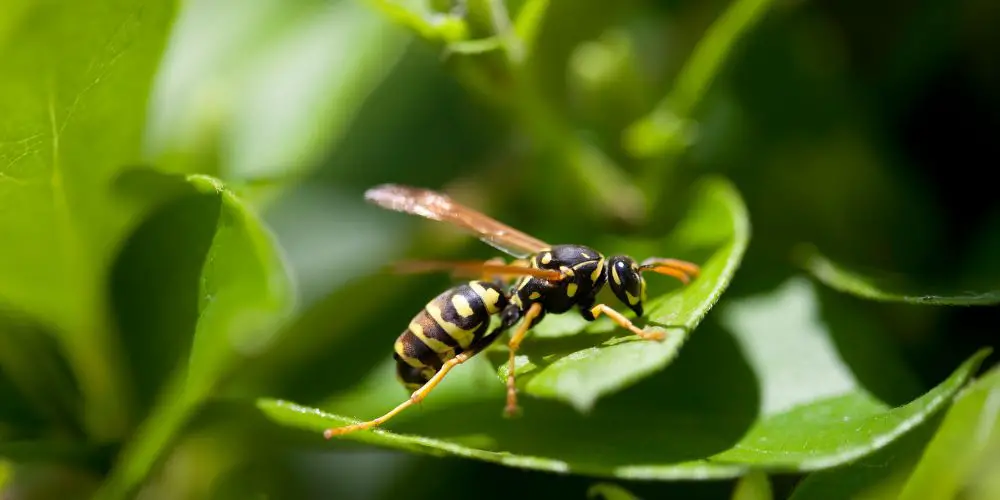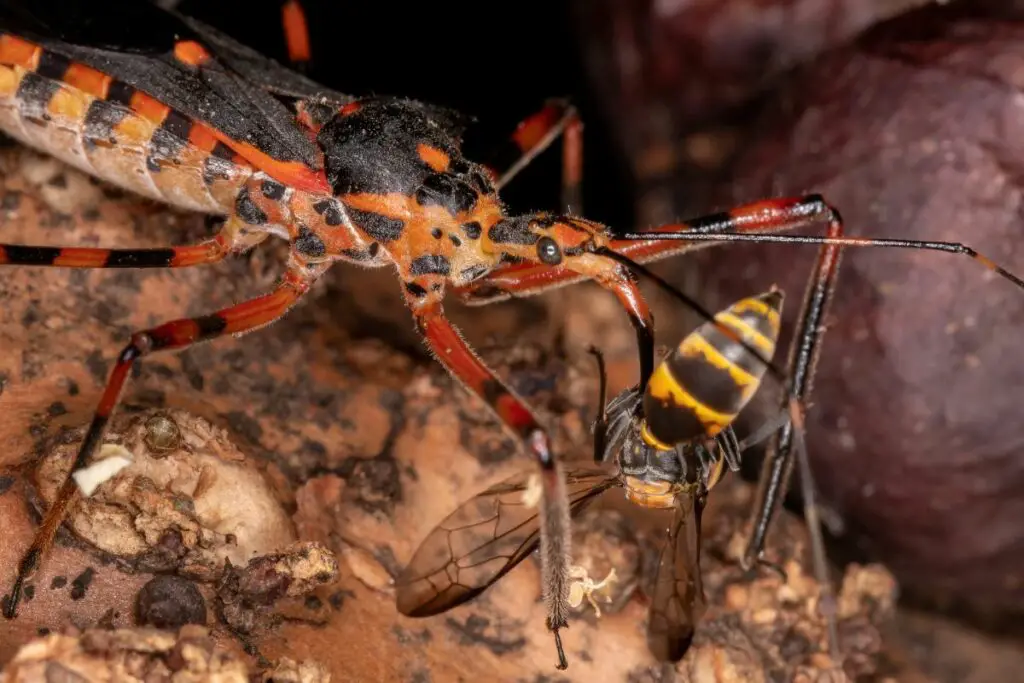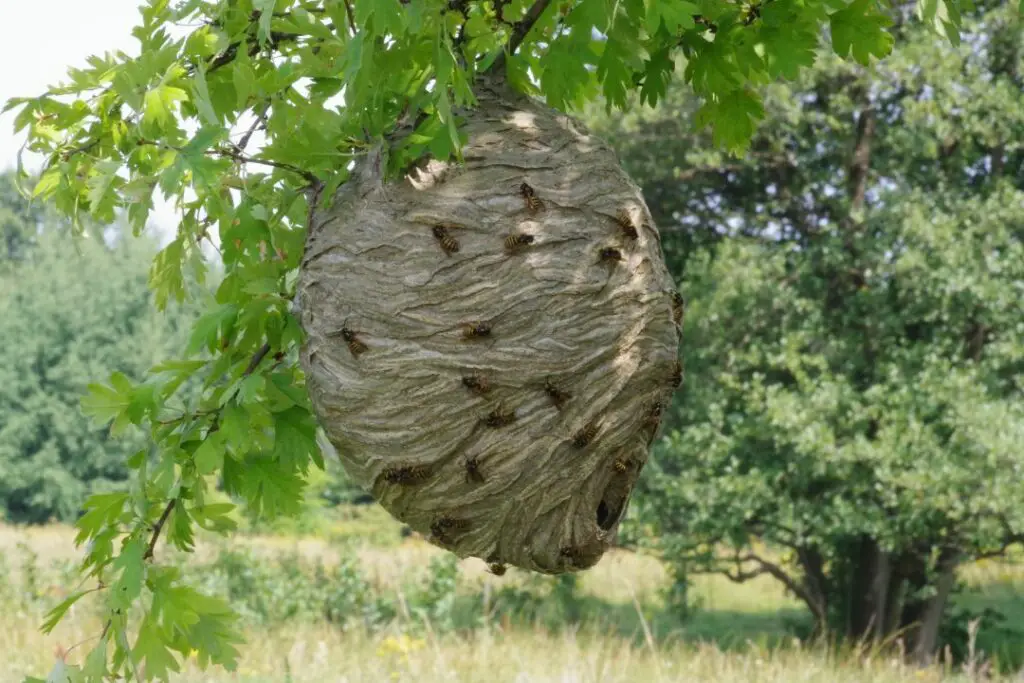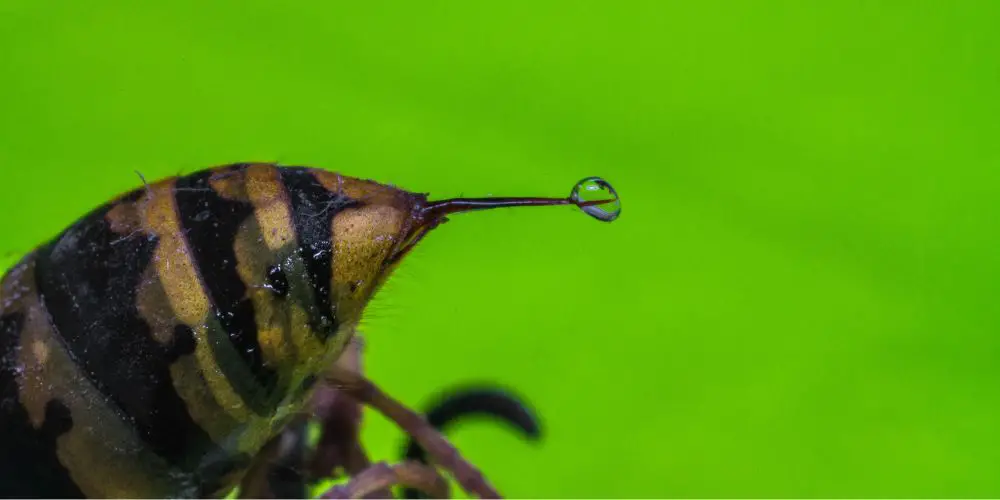Last updated on January 11th, 2024 at 02:39 pm
Insects are fascinating creatures, their intricate behaviours and interactions have been studied by scientists and entomologists alike, revealing a complex and intricate world of insect warfare.
One of the most obvious and interesting battles in the insect world is the ongoing war between wasps and bees.
So let’s take a deep dive into the undergrowth to find out, do wasps kill bees?
do bees and wasps get along?
Wasps and bees are both members of the Hymenoptera order, which means they share many of the same characteristics.
They’re both social insects that live in colonies and they both use stingers for self-defence (and in the wasp’s case, to capture prey).
But despite all these similarities, there is one striking difference that sets these two creatures apart.
Bees are herbivores (excluding the vulture and sweat bee which has evolved some fascinating eating habits), spending the majority of their day feeding on nectar and pollen whereas wasps are carnivorous predators that feed on a whole range of other critters.
Do Wasps Eat Bees?
The short answer to this question is yes, wasps do sometimes kill bees. Several species of wasps are known to actively prey on bees in both their adult and larval forms.
This is the simple answer but there’s a lot more that goes into why and when wasps choose to attack bees.
Do Wasps Attack Bees?
Wasps spend much of their early spring gathering resources for the young larvae back at their nest.
Part of this forage includes meat and dead insects and it’s fair to say that some of these insects will have been dispatched purely for food.
This somewhat barbaric process gives the young larvae all the precious protein they’ll need to mature into healthy adult wasps.
During this time wasp larvae produce a sugary sweet secretion, not unlike that produced by aphids. The adult wasps will feed on this sugary fluid to replenish their energy stores between flights.
As summer arrives and the nest is full of adult wasps the need for a calorie-rich food source increase and wasps begin to look elsewhere for food.
This behaviour means that foraging bees that share a garden or wild area with a wasps nest are very much at risk.
How Do Wasps Kill Bees
Now we understand what wasps need to thrive we have a much better understanding of why they might attack a neighbouring bee nest.
However, the tactics each species of wasp uses can vary massively from the ambush techniques employed by paper wasps to the all-out invasion of the much larger hornet.
Let’s take a closer look at how these fascinating creatures attempt to make bees their lunch.
Paper wasps
Paper wasps will often attack honeybees that are returning to their hive with pollen and nectar, using their stingers to paralyze them.
Then they carry the paralyzed bees back to their nests, where they’ll be used as food and fed to the hungry wasp larvae.
Velvet ants
Velvet ants despite their name are wasps and are known for their bright, contrasting colours and painful stings.
They are also in the habit of parasitizing the nests of bees and other social insects.
Velvet ants will often lay their eggs in the nests of bees, and when their larvae hatch, they will feed on the bee larvae and pupae until they mature to full strength.
European hornets
European hornets are much larger than honeybees and are capable of killing individual bees and even destroying entire colonies.
When a European hornet locates a beehive, it will typically hover outside the entrance and wait for returning bees to land.
The hornet will then pounce on the bee, grabbing it in its powerful mandibles to prevent it from escaping and dispatching it quickly.
The hornet will then fly off with the bee to its nest, where it will feed it to its young and this is when the problems can occur.
European hornets are known to return in force killing hundreds of bees in a single day to the point of colony collapse.
Sadly the much larger hornets can easily overpower tens of bees and they have little to no defence against these fearsome predators.
how do bees kill wasps?
While they may not be quite as aggressive or fearsome bees can and will kill wasps, although it’s not a common occurrence.
Bees are typically peaceful creatures that prefer to avoid confrontation, but they are capable of defending their hives if threatened.
When a wasp approaches a hive or nest the bees will form a defensive swarm and attack the intruder in force with their stingers.
Interestingly the barbed stingers of honey bees are much more effective when they sting a wasp and unlike with our elastic skin bees can often dislodge their stinger to attack repeatedly.
The venom from the bee’s stinger will begin to affect the wasp’s movement and flight and after several stings, it will become paralyzed before slowly dying.
It’s worth noting that not all bees will attack wasps in this way. Some species of bees, such as carpenter bees, are solitary and don’t have hives to defend.
Can bees kill hornets?
Sadly in most cases, bees have no form of defence against the much larger hornet but there is a small subset of bees that have developed a fascinating technique to dispatch any hornets that dare to enter their nest.
The Buddha bees use a form of mass suffocation to cook any unsuspecting hornets alive.
When a hornet enters a nest or hive the bees will hold back waiting for it to enter enough that escape becomes impossible.
As if a signal has been sounded all of the bees will attack and begin to smother the attacker in a living ball of bees.
Now hornets have one major weakness heat. They struggle to control their internal temperatures and all the friction, buzzing and movement is slowly but surely turning up the temperature and before you know it the hornet expires for heat exhaustion.
This process is fascinating and you can see it in cation on this fascinating video from BBC Earth:
Conclusion
The relationship between wasps and bees is complex, while some species of wasps are known to prey on bees, there are also many instances where they coexist in perfect peace.
Understanding the dynamics of this relationship can help us appreciate the intricate and fascinating world of insect warfare that brings a whole new level of understanding to your garden or wild space.
If you’ve enjoyed this short read make sure to check out some of our other great articles below packed full of fascinating facts about your garden’s inhabitants.




